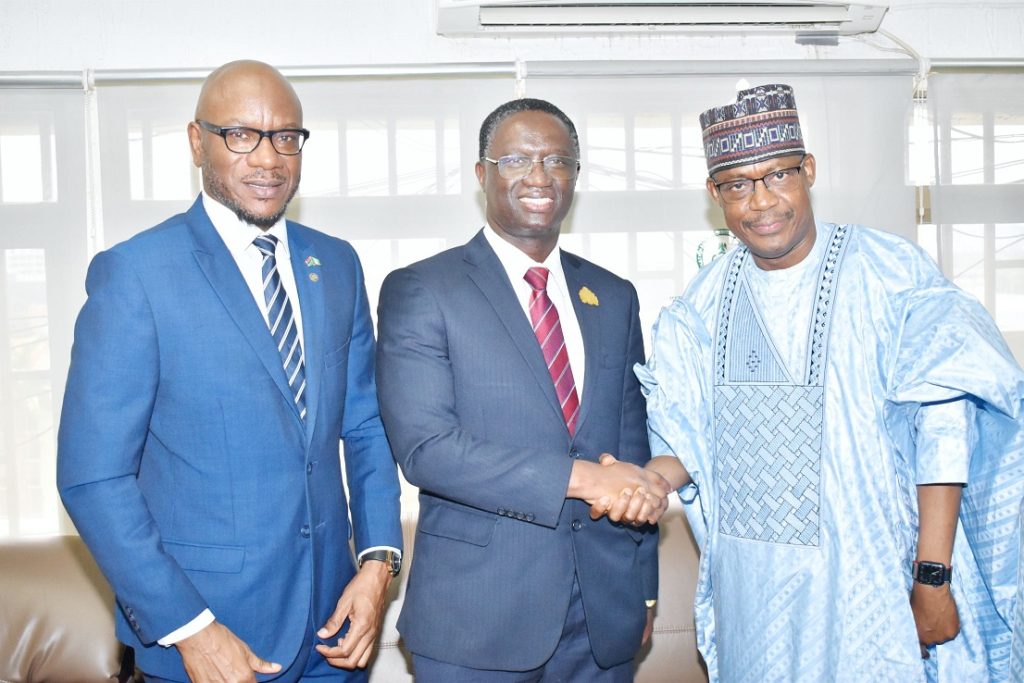
A powerful delegation from the Gambian Ministry of Education, led by the Minister of Higher Education,
Professor Pierre Gomez, last week Monday, visited the National Universities Commission (NUC), to seek
more collaborations with the Commission on scholarships and capacity building.
Receiving the delegation on behalf of the Ag. Executive Secretary, the Deputy Executive Secretary,
Academics, Dr. Noel Biodun Saliu, gave a rundown of the evolution of the university education in
Nigeria which started with the setting up of the Commission as a Unit in the cabinet, through its growth
and development up till the present moment that the Commission boasted of having 260 universities
across different proprietorship.
Briefing the NUC management on the purpose of their visit to the Commission, Professor Gomez said
that Gambia was embarking on transformation agenda of the university system and the entire education
sector at large hence their coming to Nigeria, stressing that it would be incomplete without consulting the
sister country like Nigeria for its unwavering supports to the Gambia.
The Gambian Minister for Higher Education emphasised that Nigeria took the lead with ECOWAS to
defend the Gambia’s democracy and returned rule of law back to the country after a storm of crisis
orchestrated by some actors in the land. He added that the mission of the delegation was a thank you visit
to Nigeria as the University education in the Gambia started from Nigeria through its unalloyed supports
and massive contribution which saw to the evolution of university education in Gambia.
He explained further that the pioneer Vice-Chancellors, Registrars and some faculties in Gambia were
from Nigeria, stressing that Nigeria stood by Gambia and took the leadership roles in helping it towards
the realization of its dream of having a university when other stakeholders believed that with the size of
the country, it should not have a university. He added that the country had to wait for three different
reports, but with the support from and sacrifice of the good people of Nigeria, Gambia was now enjoying
the feat.
Professor Gomez told the NUC management that the Gambia’s economy relied heavily on the university
education and that with the World Bank African Centres of Excellence (ACE), Gambia had been able to
send some students to Nigerian universities and they were doing well with many females holding PhDs
from the NUS, saying that many more were being trained. He sought more supports on capacity building
for faculties especially on postgraduate scholarships.
The leader of the delegation said that Gambia could not thank Nigeria enough for the many contributions
that had led to the country’s growth and development especially in education formation, saying that
Nigeria had produced some Ministers for the country including the Ministry of Higher Education, saying
all these were part of the strong foundation built by Nigeria. He said his ministry believed that higher
education could bring the desired change and development. He emphasised that the rural urban migration
was affecting African continent and that there should be some positive response from the academia.
In his remarks, the Gambian Ambassador to Nigeria, Mohammadou M. Njie, commended the
entrepreneurial skills that sprang up in Nigeria recently which was now contained in the NUC’s new
curriculum (CCMAS), saying that Gambia would like to explore all the available opportunities in the
Nigeria’s higher education sub-sector.
He also commended NUC for the leadership roles it had played which culminated in the establishment of
Universities in Gambia as well as its commencement.
While responding, the Deputy Executive Secretary (DES) Academic, Dr. N.B. Saliu, commended the
Minister for words of praises and appreciation towards Nigeria’s gesture, stressing that the Commission
would sustain the momentum in the interest of the two countries.
On the transformation agenda of the higher education in Gambia, he promised that the Commission
would make unrelenting contributions and efforts to ensure that success was recorded.
Dr. Saliu said that capacity would be continually built in order to remain relevant as education was
dynamic and that it required innovations and research for the country to have a good strength that would
translate to more development. He added that NUC was working closely with the Association of West
African Universities (AWAU) to build a strong network that would serve the continent.
The Acting Executive Secretary, Mr. Chris Maiyaki, who joined the meeting later, described the visit as a
historic one that would cement a strong tie that had existed with the Gambian higher education system,
saying that Nigeria had no reason for not continuing on this strength.
He added that the Commission would build on the gains and sustain same through more deliberate
friendly policies on capacity building and students’ scholarships even though the NUC still had limited
space for the teeming youth who were yearning for university education but were yearly denied as the
sysyem could only absorb 50% of them.
Mr. Maiyaki said that Nigeria needed collaboration with the Gambia as the two countries shared many
things in common, noting that such partnership was mostly needed in the education sector more especially
higher education which according to him fell under the purview of the NUC. He told the delegation that
NUC had just re-engineered its curriculum with the lunch of the CCMAS for all Nigerian universities
with a view to repositioning them and making the graduates highly competitive with their peers globally.
NUC attendance included the Directors of Establishment of Private Universities, Mrs. Constance N.
Goddi-Nnadi; Human Resource, Mr. Boniface Odum; Open Distance and E-Learning, Engr. Dr. Kayode
Odedina; Office of the Executive Secretary, Mr. John Mairafi Ahmadu as well as Acting Directors of
Research, Innovation and Information Technology, Mal. Lawal Mohammed Faruk; Skills Development
and Entrepreneurship, Mal. Ashafa Ladan; Public Affairs, Alh. Haruna Lawal Ajo; Finance and Account;
Mrs. Hauwa Amos; Accreditation, Arc. Samuel Ikani; Students, Mrs. Rita Okonjo and Deputy Director,
Information, Mrs. Offiong U. Edor, among others.s
